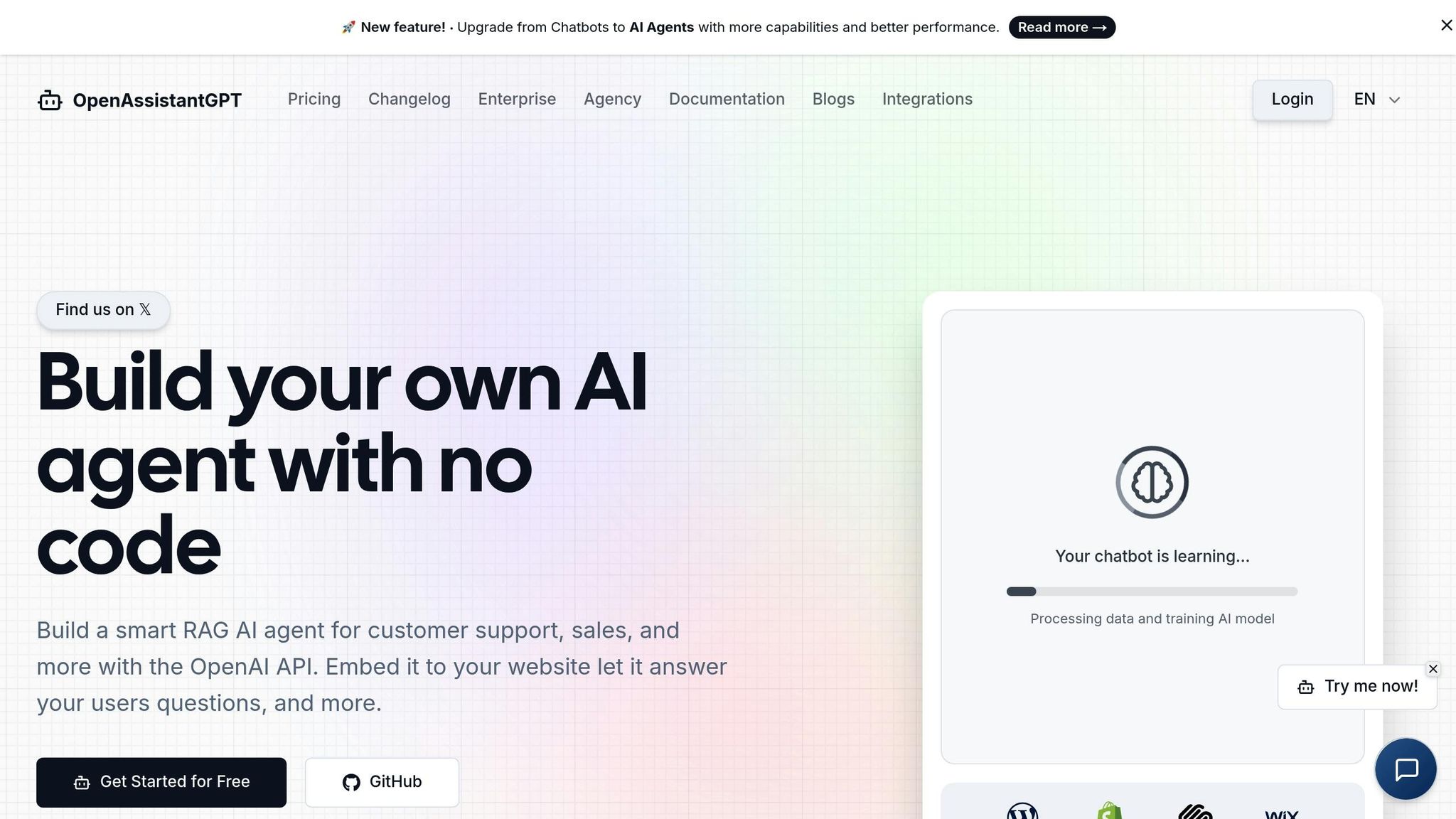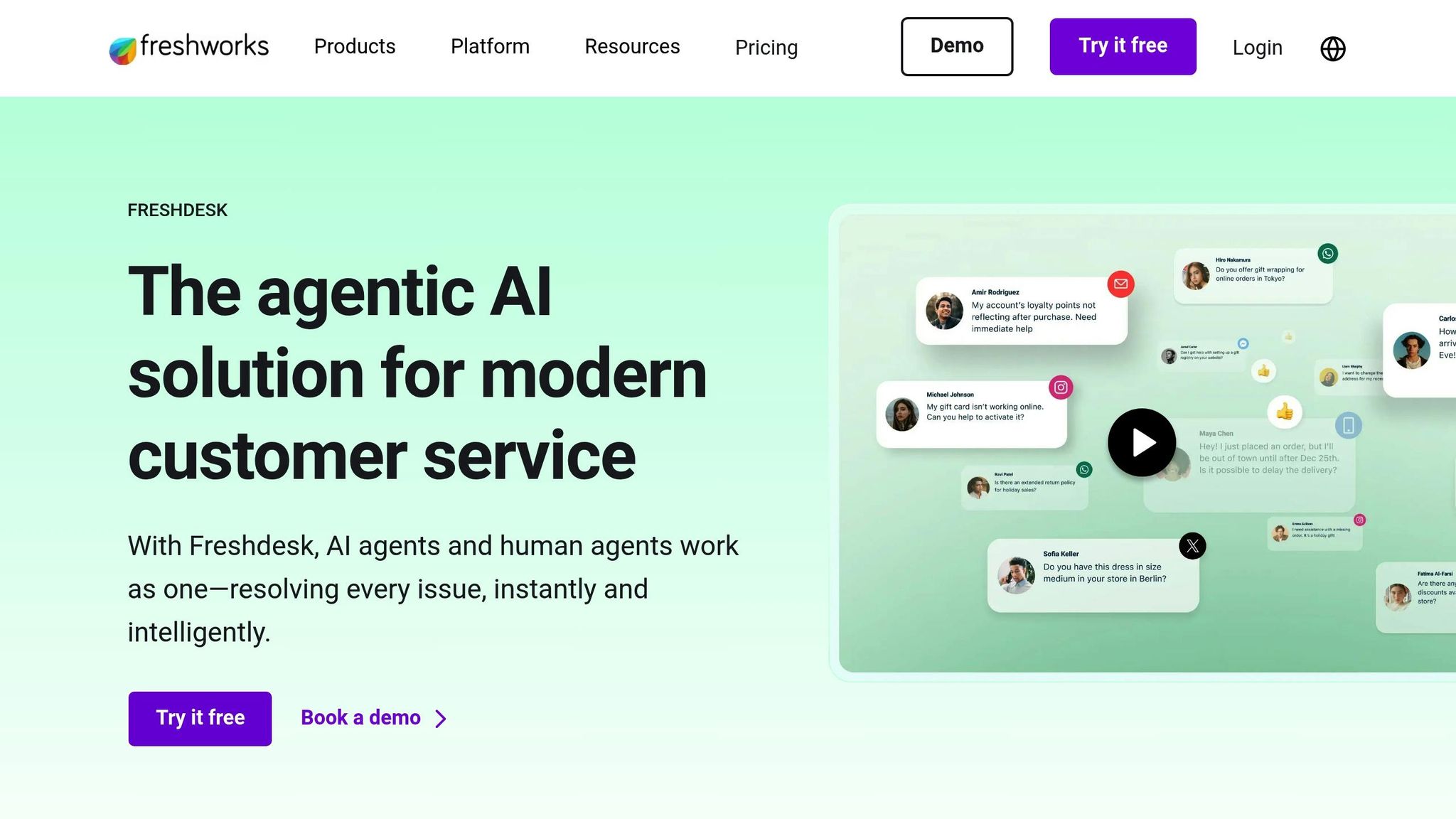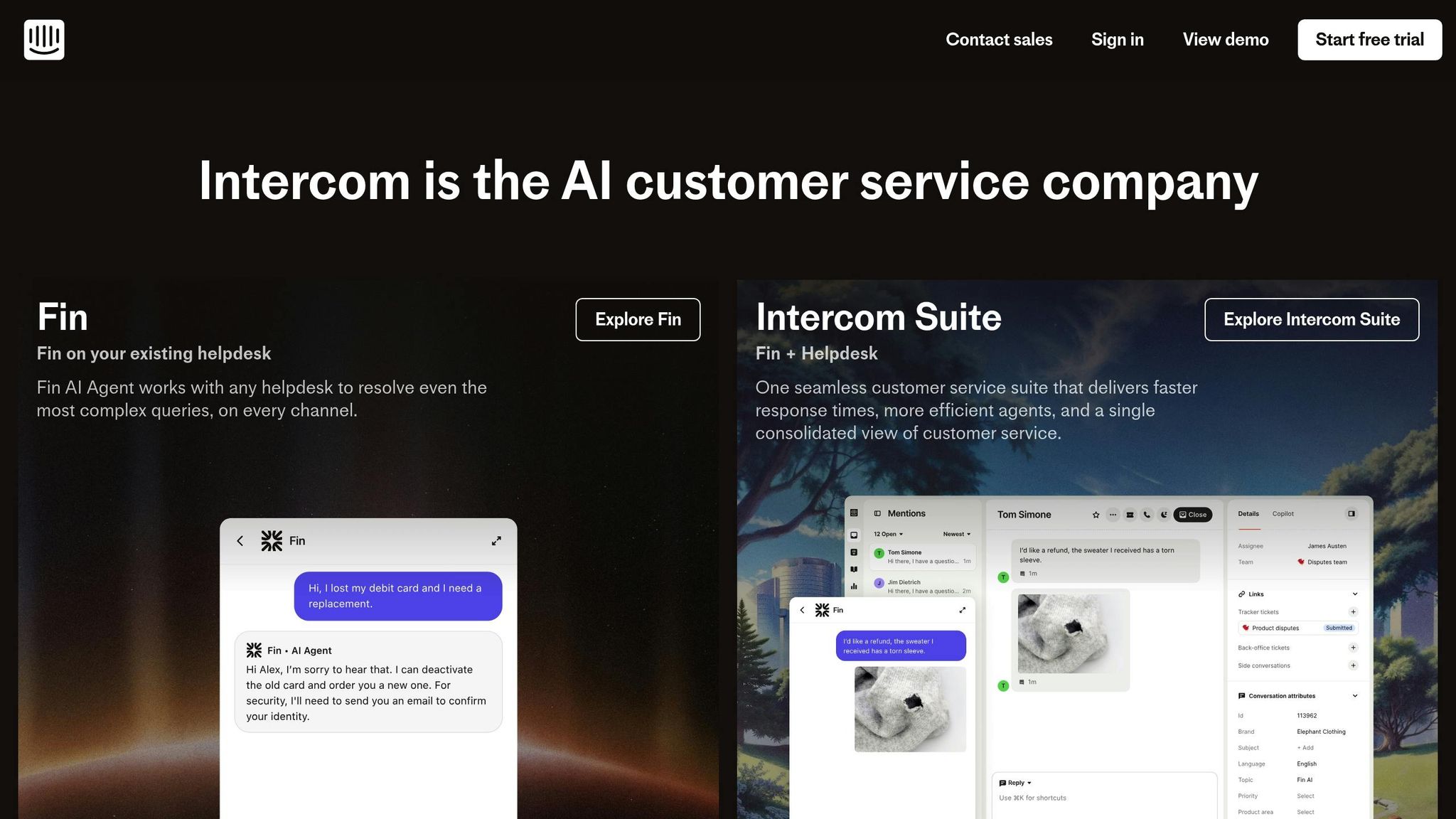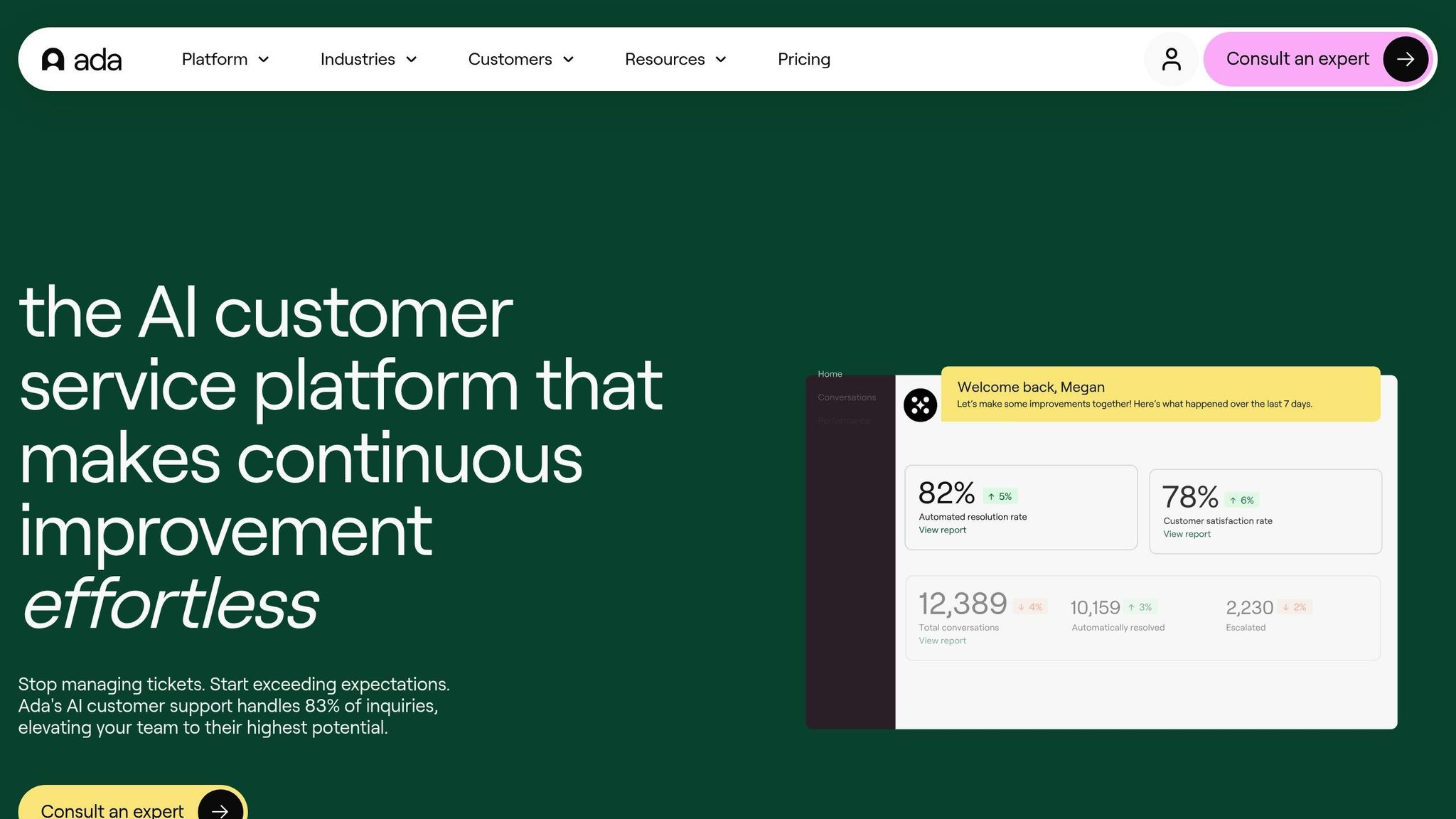Top 5 AI agent for customer support for your business in 2025

Top 5 AI agent for customer support for your business in 2025
AI agents have transformed customer support in 2025, offering fast, 24/7 service while reducing costs. These tools handle repetitive tasks, improve response times, and gather useful data to enhance customer experiences. Businesses of all sizes can now implement AI-driven solutions, thanks to no-code platforms that simplify setup and customization. Here's a quick look at five standout AI agents:
- OpenAssistantGPT: A no-code platform with advanced AI models like GPT-4, offering features like real-time API interactions, omnichannel support, and lead collection.
- Freshdesk: Combines ticketing with Freddy AI for automated responses, sentiment analysis, and cross-channel support.
- Intercom: Centralizes customer interactions across multiple channels, ensuring smooth communication.
- Zendesk AI: Automates routine tasks, integrates with CRMs, and supports US-specific formats and compliance.
- Ada: Simplifies deployment with no-code tools and scales easily for growing businesses.
These AI tools are reshaping how businesses engage with customers, providing efficient solutions tailored to their needs.
Build Your First AI Support Agent (Case Reviews + Q&A)
What Makes an AI Agent Important for Customer Support in 2025
The world of customer support has undergone a major transformation, and AI agents now play a central role in keeping businesses running smoothly. These systems bring a new level of efficiency and service quality. Let’s dive into what makes them so critical.
At the core of their effectiveness is intelligent automation. Unlike older systems that relied on rigid scripts, today’s AI agents understand context, interpret customer intent, and deliver tailored solutions. For instance, an AI agent can quickly determine whether a customer needs a shipping update or wants to modify an order, eliminating the frustration of endless menu options.
What sets these agents apart is their reasoning ability. They don’t just respond - they evaluate situations, connect the dots, and decide on the best course of action. Imagine a customer mentioning a billing issue while hinting at canceling their subscription. A well-designed AI agent can address the billing concern while recognizing the importance of customer retention, handling both with precision.
Scalability is another game-changer. As businesses grow, AI agents can manage thousands of conversations simultaneously without missing a beat. During busy periods, they maintain speed and accuracy, unlike human teams that may struggle to keep up. This is especially valuable for U.S. companies serving customers across multiple time zones, ensuring consistent support around the clock.
With omnichannel support, AI agents provide seamless assistance across platforms like email, chat, social media, and phone calls. A customer might start a conversation on Twitter, follow up via email, and finish it through live chat - all without having to repeat themselves. The AI agent keeps track of the entire interaction, ensuring continuity and saving the customer’s time.
The rise of no-code customization has made it easier for businesses of all sizes to adopt AI agents. Now, even small businesses can configure these systems to reflect their unique workflows, brand voice, and terminology. This means local businesses can deliver high-quality support without needing a massive tech team.
Integration capabilities are key to how well AI agents fit into existing operations. The best systems connect effortlessly with tools like CRM platforms, inventory databases, payment systems, and helpdesk software. This allows AI agents to access real-time data - like inventory levels or a customer’s purchase history - to provide accurate, personalized solutions that build trust.
Secure authentication ensures that customer data stays protected while still delivering personalized service. Advanced AI agents verify identity through methods like account numbers, email verification, or security questions before accessing sensitive information. This is especially critical for U.S. businesses handling financial data or personal details under strict privacy regulations.
Another standout feature is actionable analytics. AI agents don’t just resolve issues - they collect valuable insights. By analyzing conversation trends, identifying common problems, and tracking resolution rates, businesses can better understand customer needs. These insights highlight patterns like peak inquiry times, frequently asked questions, and areas where human intervention is most effective, helping companies refine their strategies.
For U.S.-based businesses, localization features make interactions smoother. AI agents handle USD currency formatting, MM/DD/YYYY dates, imperial measurements, and other standard U.S. practices, creating a more natural experience for domestic customers.
Thanks to real-time learning, advanced AI agents get smarter with every interaction. They adapt by identifying effective solutions, learning from escalations to human agents, and incorporating customer feedback. This ensures that service quality continues to improve over time.
Finally, cost efficiency is a major driver of AI adoption. These agents handle routine tasks at a fraction of the cost of human teams. For U.S. businesses, this translates to significant savings, especially for companies that previously relied on 24/7 staffing or outsourced support.
Together, these features make AI agents indispensable for improving customer satisfaction, streamlining operations, and driving business growth.
1. OpenAssistantGPT

OpenAssistantGPT is reshaping the way businesses approach AI-driven customer support. This no-code platform, powered by OpenAI's Assistant API, allows companies to build advanced chatbots without requiring any programming knowledge. By making sophisticated AI tools accessible to everyone, it bridges the gap between technical complexity and practical usability.
What sets OpenAssistantGPT apart is its use of advanced AI models like GPT-4, GPT-3.5, and GPT-4o. These models empower support agents to tackle intricate customer queries, interpret subtle nuances, and deliver responses that feel both accurate and context-aware.
No-code Implementation
The platform features a user-friendly drag-and-drop interface, streamlining the process of setting up AI chatbots. It can automatically crawl websites to extract and analyze content from existing documentation, FAQs, and knowledge bases. This ensures the chatbot stays up-to-date with the latest company policies, product updates, and procedural changes. It also supports multiple file formats - such as CSV, XML, and images - integrating your existing support materials into the system effortlessly.
Moreover, the AI Agent Actions feature enhances functionality by enabling chatbots to interact dynamically with API endpoints. This allows for real-time tasks like checking inventory, processing returns, or updating customer account details, making the chatbot a powerful extension of your support team.
Built for Businesses of Any Size
OpenAssistantGPT is designed to grow with your business. Its tiered pricing structure accommodates everyone, from small startups to large enterprises. Whether you need basic features or advanced options like enhanced authentication and service-level agreement (SLA) guarantees, the platform offers plans that fit your needs.
Omnichannel Support and Advanced Features
One standout feature is the platform's ability to analyze file attachments. Customers can upload documents, images, or data files directly through the chat interface, allowing the AI agent to provide precise assistance - whether it’s troubleshooting an issue or extracting valuable data insights. Additionally, the platform includes a lead collection feature, turning customer support interactions into potential sales opportunities by capturing key prospect information for follow-up.
For businesses looking to customize their chatbot further, OpenAssistantGPT offers an open-source SDK. Using tools like NextJS and Vercel, companies can integrate the platform seamlessly with their existing systems, tailoring it to their unique needs.
2. Freshdesk

Freshdesk blends traditional ticketing with smart automation powered by Freddy AI. This AI system manages routine inquiries, suggests replies to support agents, and evaluates customer sentiment to flag urgent cases.
Freddy AI streamlines operations by categorizing tickets, directing them to the right departments, and even resolving straightforward queries without human involvement. This frees up support teams to handle more complex issues that need personal attention and critical thinking. It's a setup designed to align with the demands of businesses in the United States.
Scalability for Businesses of All Sizes
Freshdesk offers tiered plans that cater to companies of all sizes, from a free plan for up to 10 agents to comprehensive enterprise solutions. Built on a cloud-based infrastructure, the platform can scale to handle peak support demands. As businesses expand, they can upgrade to plans with advanced AI tools, custom workflows, and detailed reporting options.
This adaptability is especially helpful for e-commerce businesses that deal with seasonal traffic surges or companies introducing new products.
Omnichannel Support
Freshdesk enhances customer support by integrating all communication channels into one platform. Whether customers reach out via email, phone, chat, social media, or messaging apps, agents can manage everything from a single interface. This unified system ensures a seamless experience, maintaining the customer’s interaction history across channels. For example, if a customer starts a conversation on Facebook Messenger and later follows up via email, agents can view the entire thread in one place.
Freddy AI also monitors cross-channel interactions to identify trends and suggest proactive actions. For instance, if multiple customers report the same issue through different channels, the AI can notify the team and propose creating a knowledge base article or sending out updates to affected users.
US-Localized Features
Freshdesk is designed with features tailored to meet the needs of US-based businesses. It offers integrations and formatting specific to the US, ensuring smooth operations and compliance with local standards.
The system automatically adjusts for US time zones when scheduling follow-ups, setting SLA deadlines, and generating reports. Support teams can customize business hours for different regions, making sure AI-driven responses and escalation rules align with local working hours. Phone support integrates effortlessly with North American numbering systems, including toll-free numbers and extensions commonly used in the US.
The reporting dashboard uses American number formatting, with commas for thousands (e.g., 1,000) and periods for decimals (e.g., 99.5%). These localization details make it easier for US teams to interpret data without confusion over formatting differences.
3. Intercom

Omnichannel Support
Intercom brings all customer interactions together in one place, whether they happen through web chat, mobile apps, email, or social media. This centralized inbox keeps the full conversation history intact, so customers don’t have to repeat themselves every time they reach out. Support agents get a clear view of past interactions across all channels, ensuring smooth and consistent communication throughout the customer journey. This approach makes managing customer support more efficient and keeps everything connected.
sbb-itb-7a6b5a0
4. Zendesk AI
Zendesk AI transforms customer support by automating routine tasks and learning from every interaction. It handles straightforward inquiries on its own while forwarding more complicated issues to human agents, ensuring customers always get the right level of assistance.
No-code Implementation
One of the standout features of Zendesk AI is that it doesn’t require coding knowledge, making it accessible for any business. Using a simple drag-and-drop workflow builder, businesses can create automated responses quickly and easily. Plus, training the AI is straightforward - just upload documents, FAQs, or past support tickets to help it learn your company’s specific knowledge base.
Zendesk’s Answer Bot uses historical ticket data to identify common customer questions and generate relevant responses. To ensure accuracy and maintain your brand’s voice, support teams can review and approve these AI-generated replies before they’re deployed.
Scalability for Businesses of All Sizes
Zendesk AI grows with your business without the need for major infrastructure overhauls. For smaller companies, it can manage frequent questions, like those about shipping or return policies. As ticket volumes increase, the AI steps up to handle more complex inquiries while maintaining high-quality responses. Larger enterprises can take advantage of features like advanced sentiment analysis and predictive routing, ensuring personalized and efficient service even with heavy customer interaction. This adaptability means Zendesk AI can support businesses at any stage, seamlessly managing customer interactions across all channels.
Omnichannel Support
Zendesk AI keeps customer service consistent across email, chat, phone, and social media. Whether a customer starts a conversation on web chat and continues it via email or switches to Facebook Messenger, the AI retains the full context of their issue. This ensures customers don’t have to repeat themselves and makes transitions between automated systems and human agents smoother. A unified dashboard consolidates all interactions into a single timeline, giving support agents access to past AI actions, customer sentiment, and other key details - all in one place. These tools allow agents to provide personalized and informed assistance, enhancing the overall customer experience.
US-localized Features
Zendesk AI also includes features designed specifically for US businesses. It automatically formats currency in dollars ($) and uses the MM/DD/YYYY date format, aligning with US standards. It integrates seamlessly with popular tools like Salesforce, HubSpot, and QuickBooks, and understands American English, including regional phrases and business terminology. The AI can also handle time zone differences across the US, integrates with major US payment processors for order-related support, and ensures compliance with US data privacy laws. To top it off, Zendesk provides dedicated support during standard US business hours, making it a perfect fit for American companies.
5. Ada

Ada simplifies customer support by allowing teams to deploy AI-powered responses instantly through an easy-to-use, no-code platform. This approach makes it possible for businesses, regardless of their technical expertise, to automate support processes and deliver faster, more consistent resolutions without writing a single line of code.
The platform stands out with its seamless integration capabilities, connecting effortlessly with popular CRM systems, helpdesk platforms, and other tools frequently used by U.S. businesses. Ada also shines in providing omnichannel support, ensuring smooth and uninterrupted conversations across web chat, mobile apps, email, and social media. As companies expand, Ada’s infrastructure scales to manage higher ticket volumes while maintaining personalized and high-quality responses.
Ada’s design aligns with the growing demand for agile, omnichannel customer service, which is crucial for businesses aiming to deliver standout support experiences in 2025. While many platforms offer similar features, Ada’s integration flexibility and ability to scale make it a strong contender in today’s competitive market.
Feature and Pricing Comparison
Let’s take a closer look at OpenAssistantGPT's features, pricing, and scalability. Whether you're working on personal projects or running a large enterprise, this platform offers plans tailored to different needs.
Here’s a breakdown of the pricing tiers and what each includes:
- Free Plan: Perfect for personal use or small experiments, this plan comes with 1 chatbot and allows up to 500 messages per month - completely free.
- Basic Plan ($18/month): Designed for growing businesses, this plan offers 9 chatbots and unlimited messages, providing excellent value for teams ready to scale.
- Pro Plan ($54/month): Ideal for organizations that need advanced tools, this plan supports 27 chatbots, includes file attachments, and offers custom domains for a professional touch.
- Enterprise Plan: Tailored for large-scale needs, this plan features unlimited chatbots and advanced security options like SAML/SSO authentication. Pricing is customized based on requirements.
Key Features Across Plans
| Feature | Availability |
|---|---|
| No-Code Setup | Fully intuitive and accessible |
| Unlimited Messages | Included starting from the Basic Plan |
| File Analysis | Available in all paid plans |
| Web Crawling | Enabled across all plans |
| Custom Domains | Offered in Pro and Enterprise plans |
| SAML/SSO Authentication | Exclusive to the Enterprise plan |
| Lead Collection | Integrated into all plans |
OpenAssistantGPT stands out with its user-friendly setup, flexible pricing, and robust security features. Whether you’re a solo entrepreneur or managing a large team, the platform provides the tools you need to enhance customer support and streamline operations.
Final Thoughts
By 2025, AI agents are set to play a major role in U.S. customer support, simplifying operations and boosting competitiveness. These tools excel at handling routine questions 24/7, speeding up response times and allowing human agents to focus on complex, high-value interactions.
To make the most of these capabilities, businesses need to choose AI tools that align with their size, goals, and budget. For small businesses and startups, the focus should be on platforms that are easy to set up and come with affordable entry-level plans. These options let smaller teams test AI-powered support without committing to heavy upfront costs.
Mid-sized companies, on the other hand, should look for scalable platforms that integrate smoothly with existing CRMs and help desk systems. As customer inquiries grow, the ability to manage higher message volumes becomes key to maintaining service quality.
For large enterprises, advanced security features like SAML/SSO are critical to safeguard data and comply with U.S. regulations. Custom domain options and white-label solutions also help maintain brand consistency across all customer interactions. These features ensure that AI tools can be seamlessly woven into a company’s broader customer service strategy.
Different industries may have unique needs as well. E-commerce businesses benefit from AI agents that can handle tasks like order tracking, processing returns, and answering product-related questions. SaaS companies often require agents capable of technical troubleshooting and integrating with product documentation, while service-based businesses might prioritize features like appointment scheduling and lead collection.
For long-term success, it’s important to continuously refine your AI tools. Regular performance tracking, knowledge updates, and ongoing training ensure that your AI agents stay effective. By combining AI’s speed and efficiency with human oversight, businesses can deliver fast responses without losing the personal touch customers value.
FAQs
How does OpenAssistantGPT protect customer data and ensure privacy during interactions?
OpenAssistantGPT places a strong emphasis on data security and privacy, following rigorous industry standards to safeguard sensitive information. Customer data is handled with secure encryption methods, ensuring it remains protected from unauthorized access at every step.
Moreover, OpenAssistantGPT is built to meet key privacy regulations like GDPR and CCPA, giving businesses confidence in how customer information is managed. Through advanced anonymization methods and minimal data retention practices, it upholds customer trust while providing tailored and efficient support.
What should small businesses and large enterprises consider when selecting an AI agent for customer support?
When you're picking an AI agent for customer support, what matters most can depend a lot on your business size. For small businesses, the focus is usually on simplicity, affordability, and tools that don’t require coding. These features make it easier to get started quickly without needing a tech expert on hand.
For large enterprises, the priorities shift. They often look for solutions that can handle complex operations, integrate smoothly with existing systems like CRMs and ticketing platforms, and scale as their needs grow. Efficiency in managing intricate workflows is key.
No matter the size of your business, the AI agent you choose should fit your goals, work well with your current setup, and boost customer satisfaction by delivering accurate and timely responses. Look for options that not only streamline interactions but can also grow alongside your business.
What are the best ways to evaluate how AI agents improve customer support and satisfaction?
To understand how AI agents influence customer support and satisfaction, businesses should focus on a mix of performance metrics and direct customer insights. Begin by collecting customer feedback through surveys or sentiment analysis to gauge satisfaction levels and identify pain points.
Next, monitor key metrics such as average resolution time, first contact resolution rates, and cost savings to measure operational efficiency. AI tools can also play a role in quality assurance by analyzing customer interactions to pinpoint areas for improvement. These combined efforts provide a well-rounded view of how AI agents can improve customer experiences while optimizing support processes.